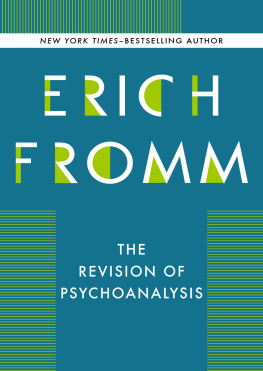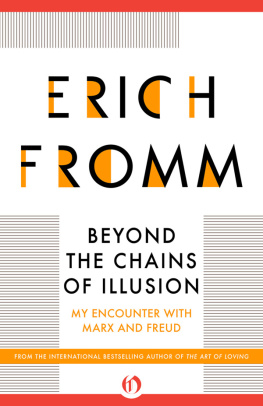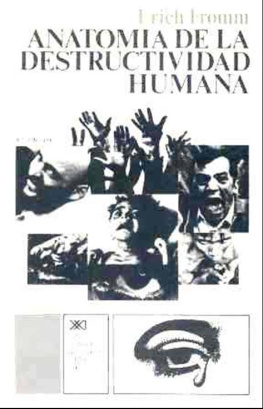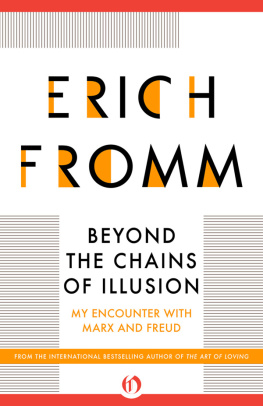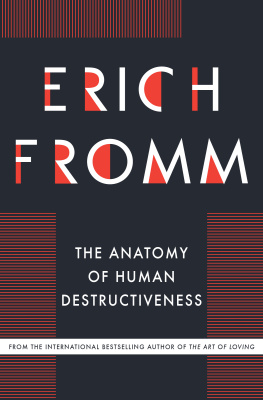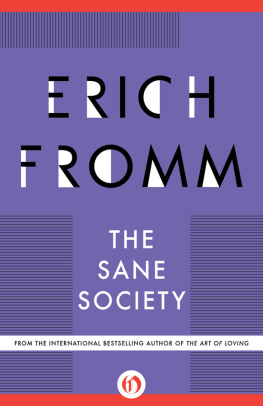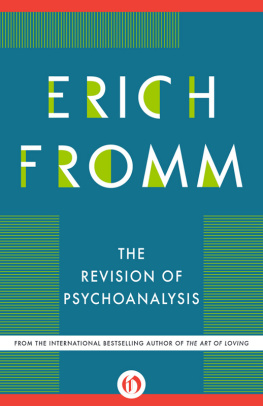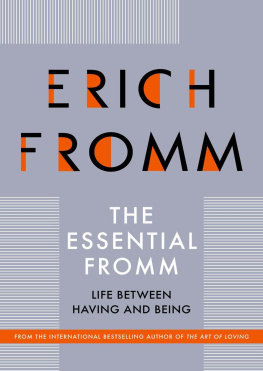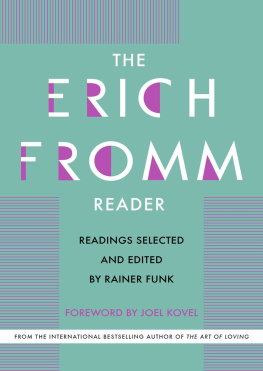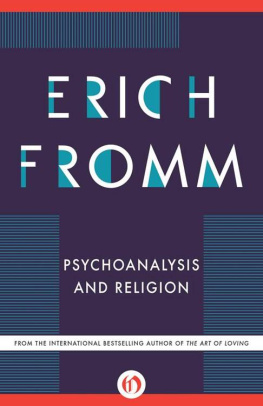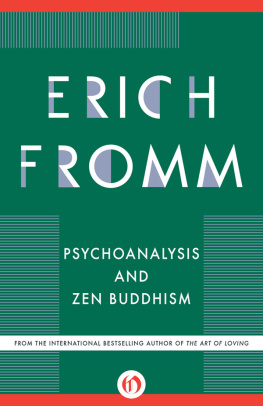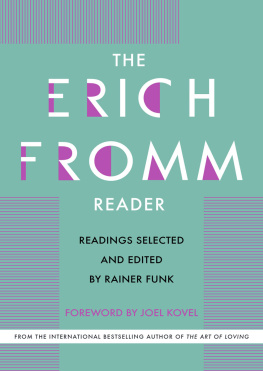Erich Fromm - Revision of Psychoanalysis
Here you can read online Erich Fromm - Revision of Psychoanalysis full text of the book (entire story) in english for free. Download pdf and epub, get meaning, cover and reviews about this ebook. genre: Science. Description of the work, (preface) as well as reviews are available. Best literature library LitArk.com created for fans of good reading and offers a wide selection of genres:
Romance novel
Science fiction
Adventure
Detective
Science
History
Home and family
Prose
Art
Politics
Computer
Non-fiction
Religion
Business
Children
Humor
Choose a favorite category and find really read worthwhile books. Enjoy immersion in the world of imagination, feel the emotions of the characters or learn something new for yourself, make an fascinating discovery.
- Book:Revision of Psychoanalysis
- Author:
- Genre:
- Rating:5 / 5
- Favourites:Add to favourites
- Your mark:
- 100
- 1
- 2
- 3
- 4
- 5
Revision of Psychoanalysis: summary, description and annotation
We offer to read an annotation, description, summary or preface (depends on what the author of the book "Revision of Psychoanalysis" wrote himself). If you haven't found the necessary information about the book — write in the comments, we will try to find it.
Revision of Psychoanalysis — read online for free the complete book (whole text) full work
Below is the text of the book, divided by pages. System saving the place of the last page read, allows you to conveniently read the book "Revision of Psychoanalysis" online for free, without having to search again every time where you left off. Put a bookmark, and you can go to the page where you finished reading at any time.
Font size:
Interval:
Bookmark:


In 1965 Erich Fromm became professor emeritus of psychoanalysis at the National Autonomous University of Mexico City. In the same year he finished his field research on the social character of the Mexican peasant village Chiconcuac. Released from his obligations at the university and free for a new project, he applied to various funding organizations for money to undertake a Systematic Work on Humanistic Psychoanalysis, which he had decided to write in the course of the next few years. It was conceived as a work of three to four volumes that would deal with the complete range of psychoanalytic theory and practice. He intended nothing less than a dialectic revision.
Originally, Fromm wanted to write this systematic and comprehensive work of psychoanalysis against the backdrop of his clinical experience as a practicing psychoanalyst, teacher, and supervisor. He also wanted to enrich his project with a number of case histories. That was not to be. Although Fromm worked for years on the project, his interest over time increasingly shifted toward the problem of forming an adequate psychoanalytic theory of aggression. This work Fromm presented in 1973 in his comprehensive volume The Anatomy of Human Destructiveness.
Other aspects of his project remained unfinished or were realized only in terms of the theoretical aspects. Fromm published only one chapter out of this work: The Crisis of Psychoanalysis (Fromm, 1970c). It showed in detail the great need for the revision of psychoanalysis, even in its forms of further development as exemplified by the so-called Ego Psychologists. Fromm did not, however, publish his own positionhis re-formulation and re-vision of psychoanalysis.
This volume contains the until now unpublished parts of Fromms humanistic and dialectic revision of psychoanalysis, conceived between 1968 and 1970. The largest cohesive manuscript part () is therefore logically entitled The Dialectic Revision of Psychoanalysis. Here Fromm develops his method of the Psychoanalysis of Theories, which he used to revise Freuds theories. Fromm devoted special attention to the importance of social repression for a new definition of the unconscious. This chapter also contains important explanations of Fromms perspective on therapeutic practice. And Fromm speaks for the first time here about his concept of transtherapeutic psychoanalysis, which in 1975 he included in The Art of Being (Fromm, 1989a).
Every revision of psychoanalysis must deal with the significance of sexuality to psychic processes. Fromms critique of the role imputed to sexuality is expressed in the chapter entitled argument in the chapter that appears here for the first time: The Alleged Radicalism of Herbert Marcuse.
In one of his proposals seeking funding for his planned multi-volume work on psychoanalysis, Fromm described the origin of the cognitive processes that guided his interest in the scholarly reception of Freudian psychoanalysis:
My knowledge of and interest in the fields of sociology led me at first to the application of psychoanalytic theory to social and cultural problems. My papers in this area, containing already the nuclear ideas of my later work, were published in 1932-34. These papers showed for the first time the applicability of psychoanalytic theory to social-cultural problems. In the course of these studies I began to become critical of strictly Freudian theory, and tried to modify it. Briefly, I tried to preserve Freuds fundamental discoveries, but replacing his mechanistic-materialistic philosophy by a humanistic one. Not man as a machine, regulated by the chemically produced tensionde-tension mechanism, but man as a totality, in need of relating himself to the world, was the basis of my theoretical thinking.
What Fromm insinuates here in rather simple words signals his replacement of the Freudian concept of man and its related theory of drives with a fundamentally different metapsychology: Man is to be understood primarily as a social being; the unconscious is mainly of interest in terms of the social unconscious and social repression; and the fact that man is driven is not due to instinctual drives but to his dichotomical situation as man, which is manifest in specifically human needs. Moreover, the ways of satisfaction are always social processes. The conflict between the individual and society, inherent in the Freudian concept of man, is understood by Fromm as a historically conditioned antagonism between the productive and non-productive character orientations of the individual as a social being.
Corresponding to this new approach, which Fromm sketches in the of the present volume, was his understanding of psychoanalysis as an analytical social psychology. For him the discovery of the social unconscious should be located in the therapeutic applications of psychoanalysis: Common sense, the constraints of circumstances and of so-called normalcy, and the self-evident are rationalized expressions of the fixation on idols and the belief in illusions and ideologies. All such rationalizations are, in reality, merely expressions of the Pathology of Normalcy.
Because the original English manuscript of this book was not put together in the organized form you see before you, I made additional divisions in the text and created subtitles. Necessary editorial additions and omissions within the text are marked with brackets.
Rainer Funk
Tbingen, March 1992
There is a widespread assumptionnot only in the scientific literature dealing with psychoanalysis and social psychology but also among the general publicthat a basic contradiction exists between the biological and social (or cultural) orientations in psychoanalysis. Often the Freudian orientation is called biological and the theories of the so-called neo-Freudian schools (particularly those of H. S. Sullivan, K. Horney, and this writer) are called culturalist, as if they were opposed to a biological orientation. This juxtaposition between biological and cultural emphasis is not only superficial but plainly erroneous, at least as far as my own work is concerned. I do not discuss here Sullivans or Horneys positions, in view of the fact that my own theoretical concepts differ on fundamental points from those of Sullivan and Horney, just as these two authors differ between themselves.
The idea that my points of view are anti- (or non-) biological is based on two factors: first, on my emphasis on the significance of social factors in the formation of character; and, second, on my critical attitude toward Freuds theory of instincts and the libido theory. Although it is true that the libido theory is a biological one, like every theory that revolves around the life process of the human organism, my critique of the libido theory concerns not its biological orientation as such but, rather, its very specific biological orientationnamely, that of a mechanistic physiologism, in which Freuds libido theory is rooted. I have criticized the libido theory and not Freuds general biological orientation. On the contrary, another aspect of Freuds biological orientation, his emphasis on the constitutional factors in the personality, I have not only accepted theoretically but have also considered in my clinical work. In fact, I have probably taken it a good deal more seriously than do most orthodox analysts, who often pay lip service to constitutional factors but, for all practical purposes, believe that everything in a patient is conditioned by his early experiences within the family constellation.
Next pageFont size:
Interval:
Bookmark:
Similar books «Revision of Psychoanalysis»
Look at similar books to Revision of Psychoanalysis. We have selected literature similar in name and meaning in the hope of providing readers with more options to find new, interesting, not yet read works.
Discussion, reviews of the book Revision of Psychoanalysis and just readers' own opinions. Leave your comments, write what you think about the work, its meaning or the main characters. Specify what exactly you liked and what you didn't like, and why you think so.

